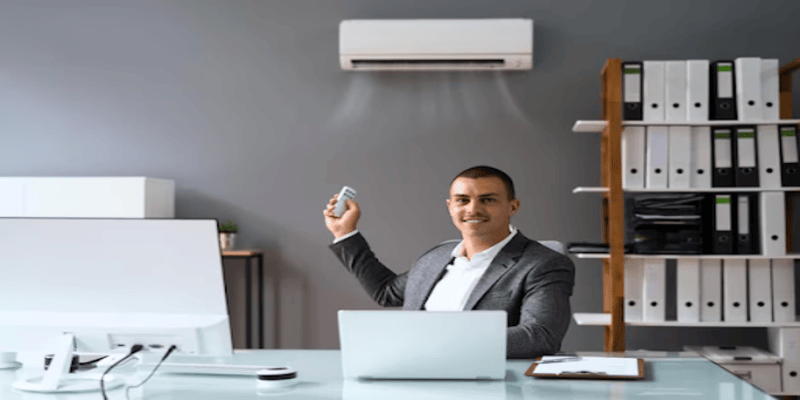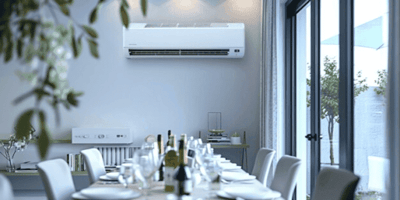Top 5 Mistakes to Avoid When Buying An Air Conditioner for Your Business
A broken air conditioner in July taught me more about business priorities than any MBA course ever could. When the AC failed at my friend's retail shop last summer, customers browsed for exactly 7 minutes before leaving. Staff productivity dropped like a stone. By day three, she was hemorrhaging money.
"I should have replaced that old unit last winter," she told me while fanning herself with an invoice. "Now I'm paying rush installation fees and losing sales every hour."
Buying an air conditioner seems straightforward until you make a costly mistake. I've helped dozens of business owners fix expensive AC blunders that could have been avoided with proper planning.
The numbers don't lie: businesses typically waste 20-30% on cooling costs through poor equipment choices. With commercial HVAC representing a significant chunk of your operational expenses, mistakes hurt your bottom line for years.
Here are the five worst air conditioning mistakes I see smart business owners make—mistakes you can easily avoid.
Mistake 1: Not Properly Sizing the Air Conditioner

"My contractor just replaced my old unit with the same size," a boutique owner complained to me last summer. "Now my back room is freezing while the front stays warm, and my electric bill jumped by $200 a month."
This might be the most expensive mistake in buying a new air conditioner. Many business owners assume that bigger means better cooling or simply replace existing units without reassessing their needs.
An oversized unit:
- Cycles on and off frequently (called "short cycling")
- Creates uncomfortable temperature swings
- Wears out faster due to constant starting/stopping
- Fails to properly dehumidify your space
- Wastes electricity with each power-up cycle
An undersized unit:
- Runs continuously without reaching target temperatures
- Struggles during peak hours or heat waves
- Wears out prematurely from overwork
- Creates unhappy customers and staff
- Eventually costs more in repairs and replacement
Professional HVAC contractors use Manual J load calculations—not rough estimates—to determine the right size. This calculation considers your specific space, including:
- Square footage (obviously)
- Ceiling height and building construction
- Window placement and quality
- Heat-generating equipment inside
- Average occupancy
- Local climate conditions
A clothing store I worked with was about to purchase a 5-ton commercial air conditioner based solely on square footage. After proper calculations, they discovered their space—with its high ceilings, western exposure, and halogen lighting—actually required 7 tons of cooling. The correct sizing prevented what would have been years of insufficient cooling and wasted energy.
Mistake 2: Ignoring Energy Efficiency Ratings

"I saved $900 upfront by going with the cheaper model," a dental office manager told me. "But now we're paying about $1,800 extra in electricity each year."
When buying an air conditioner, focusing only on the upfront price tag is shortsighted. The real cost of an air conditioner for business use includes both purchase price and lifetime operating costs.
Energy efficiency ratings may seem like boring technical details, but they translate directly to your bottom line:
- SEER (Seasonal Energy Efficiency Ratio): For standard systems, look for at least 16 SEER in most climates.
- EER (Energy Efficiency Ratio): Important for consistent performance in hot climates; aim for 11.5+ for commercial units.
- IEER (Integrated Energy Efficiency Ratio): Measures efficiency across different operating conditions; higher numbers mean better part-load efficiency.
A coffee shop owner I advised was debating between two 3-ton rooftop units: a 14 SEER unit for $5,400 and a 17 SEER unit for $6,700. The price difference seemed significant until we calculated the operating costs. With their 12-hour daily operation and local electricity rates, the higher-efficiency unit would save them about $620 annually—paying for the difference in less than three years, with another 12+ years of savings thereafter.
Energy Star certified commercial air conditioner models typically use 10-20% less energy than standard models. For businesses operating on thin margins, this efficiency directly impacts profitability.
Mistake 3: Failing to Consider Noise Levels

"We had to reschedule our podcast recording sessions around our air conditioner's cycles," a small media company owner explained. "The rumbling and clicking ruined too many takes."
Noise matters more than most business owners realize when air conditioner business decisions are made. Measured in decibels (dB), air conditioner noise can range from whisper-quiet (around 50dB) to distractingly loud (80+dB).
The impact of noise varies by business type:
- Professional services (law offices, clinics): Need near-silent operation for client conversations
- Retail: Moderate noise acceptable but shouldn't interfere with music or customer interaction
- Restaurants: Cannot compete with dining conversation or create an unpleasant atmosphere
- Manufacturing: Higher ambient noise allows more flexibility
Factors affecting noise include:
- Compressor type (scroll compressors are typically quieter than reciprocating ones)
- Fan design and blade configuration
- Insulation and cabinet construction
- Mounting and vibration isolation
- Location relative to work areas
A small law firm I consulted had installed a budget-friendly unit right above their conference room. The 72dB operational noise forced them to pause client meetings whenever the system cycled on. The eventual solution—replacing the unit with a quieter model and adding sound insulation—cost nearly three times what incorporating noise considerations would have cost during initial purchase.
Mistake 4: Not Taking Into Account Air Quality and Filtration Features

"We never thought about air filtration until half our staff started calling in sick during pollen season," a publishing company HR director told me.
When buying an air conditioner, many business owners focus exclusively on cooling power while overlooking air quality features. Yet indoor air quality directly impacts:
- Employee sick days (EPA estimates poor indoor air quality costs businesses billions annually in lost productivity)
- Customer comfort and time spent in your establishment
- Product quality in sensitive industries
- Compliance with health regulations
Modern commercial air conditioner options offer various filtration capabilities:
- Basic filters (MERV 1-4): Capture only large particles; minimal health benefits
- Better filters (MERV 5-8): Trap mold spores and some allergens
- Advanced filters (MERV 9-12): Remove most allergens and some bacteria
- Hospital-grade (MERV 13+): Filter bacteria and smoke particles
Beyond filtration, consider:
- UV germicidal lights that kill airborne pathogens
- Humidity control features that prevent mold growth
- Dedicated outdoor air systems for fresh air exchange
Different businesses have different air quality needs:
- Healthcare: Highest level filtration to prevent cross-contamination
- Retail: Good filtration to eliminate odors and enhance shopping experience
- Restaurants: Grease and odor control, plus adequate fresh air exchange
- Offices: Allergen reduction to minimize sick days
A high-end salon I worked with installed standard filtration despite their use of chemical hair treatments. The result? Customer complaints about chemical smells and staff developing respiratory irritation. Upgrading to proper filtration cost them additional money but solved both problems.
Mistake 5: Overlooking Installation and Maintenance Costs

"The unit was within budget, but the installation nearly bankrupted us," shared a small bakery owner. "The building modifications alone cost more than the air conditioner."
The sticker price when purchasing an air conditioner represents just part of your investment. Hidden costs often include:
Installation requirements:
- Electrical upgrades (dedicated circuits, panel modifications)
- Structural modifications for rooftop units
- Ductwork installation or modification
- Refrigerant line routing
- Permitting and compliance costs
Ongoing maintenance needs:
- Regular professional servicing (2-4 times annually for commercial systems)
- Filter replacement schedules
- Refrigerant checks and potential environmental compliance issues
- Parts availability and replacement costs
- System lifespan considerations
A restaurant owner I advised was shocked to discover his $9,800 air conditioner for business use required an additional $7,200 in electrical upgrades and roof reinforcement. Proper planning would have allowed these costs to be budgeted appropriately instead of creating a financial emergency.
Maintenance contracts typically run $300-1,000 annually for commercial systems but save considerably more by preventing emergency repairs and extending system life. When comparing options, consider the manufacturer's service network in your area and parts availability.
Intelligent Air Conditioner Control: A Smart Investment for Your Business

"Our smart controller paid for itself in three months," reported a hotel manager. "We now cool rooms just before guests arrive instead of all day."
The final frontier in commercial air conditioner efficiency isn't about the hardware—it's about how intelligently you control it. Smart control systems represent a fraction of your HVAC investment but can dramatically reduce operating costs.
Modern control systems offer:
- Multi-zone control tailored to different areas' needs
- Occupancy-based operation that adjusts to actual usage patterns
- Remote monitoring and adjustment capabilities
- Energy use tracking and optimization
- Integration with other building systems
- Predictive maintenance alerts before failures occur
Real-world applications include:
- Retail stores automatically adjusting temperatures based on customer traffic
- Offices reducing cooling in unused conference rooms
- Restaurants varying cooling between dining areas and kitchens
- Hotels pre-cooling rooms only when needed
Sensibo data shows businesses typically reduce HVAC energy consumption by 25-40% after implementing intelligent controls. Unlike hardware upgrades, these savings require minimal upfront investment and no construction disruption.
Making the Right Choice for Your Business
Buying an air conditioner for your business requires balancing multiple factors beyond just cooling power. The right choice depends on your specific business needs, building characteristics, and budget priorities.
To make an informed decision:
- Work with qualified commercial HVAC professionals familiar with your business type
- Request detailed load calculations, not estimates
- Consider lifetime operating costs, not just purchase price
- Factor in noise impact on your specific operations
- Don't skimp on air quality features appropriate to your industry
- Budget realistically for installation and ongoing maintenance
- Investigate smart control options to maximize efficiency
A properly selected and installed air conditioner for business use represents not just a necessity, but a strategic investment in your operation's success. By avoiding these five common mistakes, you'll create a comfortable environment that supports your business goals while minimizing operating costs.
Remember that comfort isn't a luxury in business—it's a productivity and customer experience essential that directly impacts your bottom line. The right system, properly sized, efficiently operated, and well-maintained, will serve your business reliably for years to come.



































.jpg?height=200&name=photo_2025-01-17_21-00-09%20(1).jpg)
.jpg?height=200&name=photo_2024-09-05_19-19-23%20(1).jpg)

.jpg?height=200&name=empty-modern-coworking-office-environment-with-panoramic-windows%20(1).jpg)


